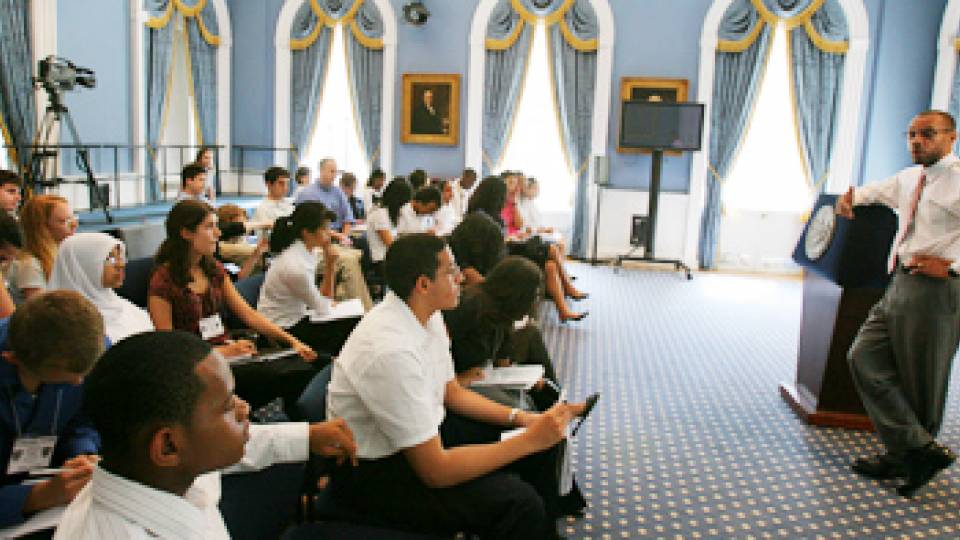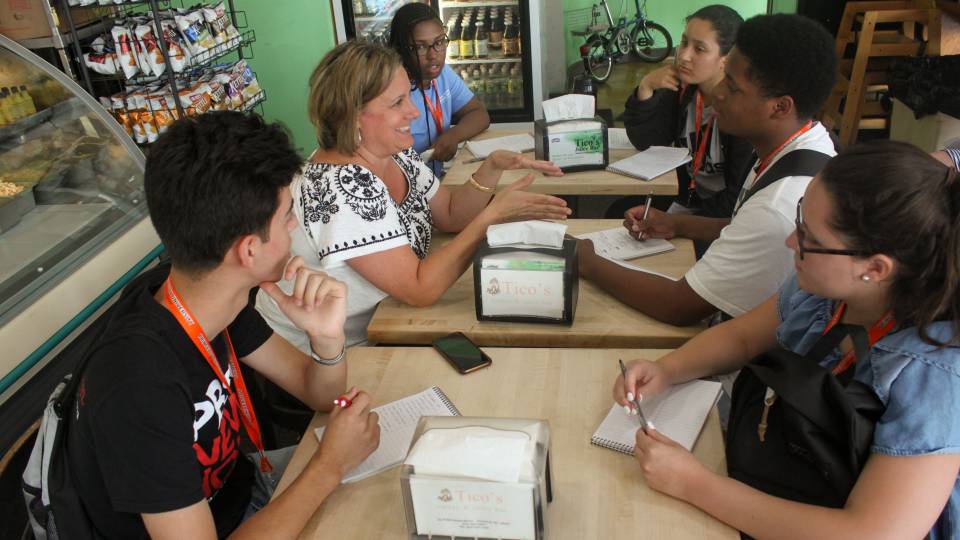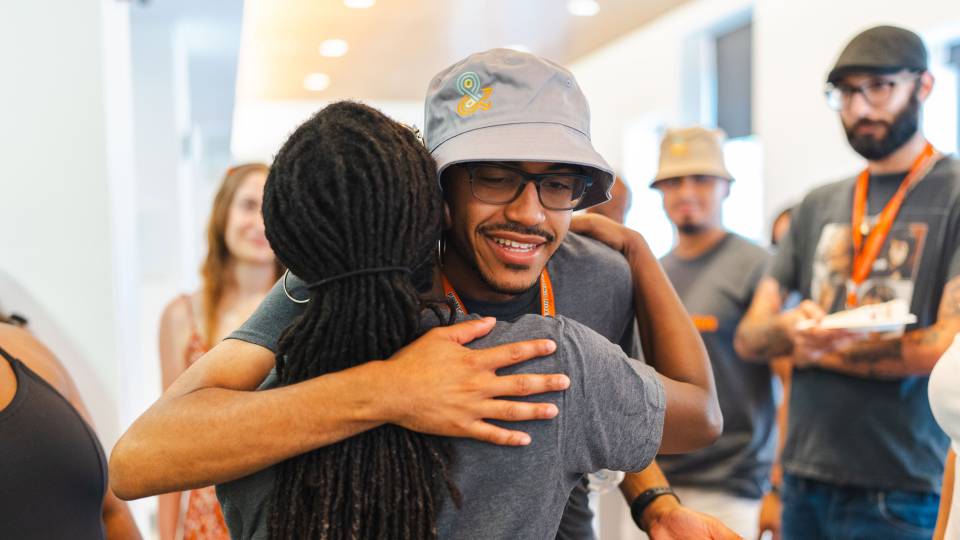High school student Shawdae Harrison got a one-of-a-kind seminar in astrophysics this summer when she spent an hour one afternoon talking with Princeton scientists Lyman Page(Link is external) and David Spergel(Link is external) about the makeup of the universe.
“It was a new experience -- I’ve never interviewed a scientist before,” said Harrison, a Baltimore native, who is one of 21 high school students participating in 10 days of intense, hands-on journalism study as part of the Princeton University Summer Journalism Program(Link is external).
Now in its ninth year, the program offers rising high school seniors from under-resourced financial backgrounds an immersion in journalism with workshops on the First Amendment, trips to New York City to visit news organizations, and practice reporting stories with high-profile sources such as Page and Spergel. The program also offers in-depth assistance with applying to college.
Harrison and three other students met the scientists in Spergel’s office at Peyton Hall, where they peppered them with questions: How long have you been working with each other and how has your relationship been? How long was your experimental research process for mapping the universe? Did you ever imagine as young students that you would accomplish all that you have?
Page and Spergel gave long, thoughtful answers to every question, even walking the students through a complex set of equations when Yared Portillo, who is from Santa Maria, Calif., asked, “What’s on the board over there?”

High school student Shawdae Harrison takes notes during an interview with Princeton astrophysicists Lyman Page and David Spergel, one of many reporting experiences the program offers. The students also take a practice SAT exam and receive guidance on applying to college.
Page, the University’s Henry DeWolf Smyth Professor of Physics(Link is external), and Spergel, the Charles A. Young Professor of Astronomy(Link is external) on the Class of 1897 Foundation, described for the students the work on which they have collaborated. Their findings have contributed to breakthroughs in better understanding the shape, makeup and age of the universe. Both won the international Shaw Prize(Link is external) in May.
Alfonso Toro Jr. asked what advice they would give to students who want to pursue a career in science.
“Doing science is hard, and there’s lots of frustration along the way,” Page said.
“You really need to love what you’re doing to be a scientist,” Spergel added. “Most things don’t work, but every now and then it works, and it’s wonderful.”
Toro said he was thrilled by the opportunity to spend time with Page and Spergel. “I got the chance to talk to two guys who mapped the universe. It’s really wonderful,” said Toro, who is from Bell Gardens, Calif. Toro and the other students used what they learned in the interview to write feature stories on the scientists, which will appear in the program’s newspaper, The Princeton Summer Journal(Link is external) (PDF).
Other students in the journalism program researched their stories by talking to patrons at a Princeton yogurt shop and interviewing the University’s men’s basketball coach, among other projects. Later in the week they investigated whether cars idling on New York City streets are damaging the environment, wrote movie reviews and toured The New York Times.

A visit to a local yogurt shop provides interview fodder for students (from left) Brenda Duman, Carissa Eclarin and Franklin Lee, who pose questions to Twist Yogurt owner Cindy Sausalito.
While sharpening the students’ journalism skills, the program also helps with the college application process by offering workshops on writing college essays, a practice SAT exam and a discussion with Princeton’s admission director. Students receive help with applying to college throughout their senior year of high school as well.
Graduates of the program have gone on to attend Princeton, Harvard, Johns Hopkins, Stanford, Yale and other selective schools. And many alumni of the program return each summer to serve as mentors for the next crop of students, and to help run the program.
“Our alumni are teaching the majority of the workshops this summer,” said Rich Tucker, a member of the class of 2001 and one of the four alumni of The Daily Princetonian(Link is external) (Link opens in new window) student newspaper who founded the program. “They show our current students what can be accomplished.”
The program was begun in the summer of 2002 by former members of The Daily Princetonian’s editorial board, and has grown to attract more than 250 applicants nationwide.
Tasnim Shamma, who attended the program in 2006, returned this summer to help teach the program’s new media component. A member of Princeton’s class of 2011, she is the multimedia editor of The Daily Princetonian and has an internship this summer at Newsweek.
“This is a life-changing program,” Shamma said. “I was not even considering applying to Princeton because I was certain I could never get in. But the directors convinced me to apply. A large part of the program is devoted to preparing students for applying for financial aid and scholarships.”
And the program’s mentoring extends beyond college admission.

Students get a one-of-a-kind seminar in the makeup of the universe while interviewing Princeton astrophysicists Lyman Page (far left) and David Spergel (far right). From left, students Shawdae Harrison, Alfonso Toro Jr., Yared Portillo and Elizabeth Gonzalez wrote feature stories about their interview, one of several ways in which the students honed their reporting skills.
“If I have a question about how to approach a story or find myself in a journalistic ethical dilemma, I feel very comfortable just e-mailing one of (the program’s directors or alumni) and asking for advice,” Shamma said.
This summer Shamma is helping the students expand their multimedia abilities by working with them on writing blogs, posting Twitter updates and producing videos during the program to “arm them with multimedia skills that they can take back to their high school newspapers and internships,” she said.
The presence of Shamma and other program alumni helps students like Elizabeth Gonzalez, who is from El Paso, Texas, to see their future more clearly.
“Being able to talk to alumni and the directors, I’m realizing the possibilities for college,” said Gonzalez, whose trip to Princeton marked her first visit to the East Coast. All expenses, including students’ travel costs to and from Princeton, are paid for by the program, which is funded mainly by alumni contributions.
“Coming to the Princeton campus, meeting students from all over the country and getting advice from Princeton alumni has truly made it a magical experience,” Toro said.






